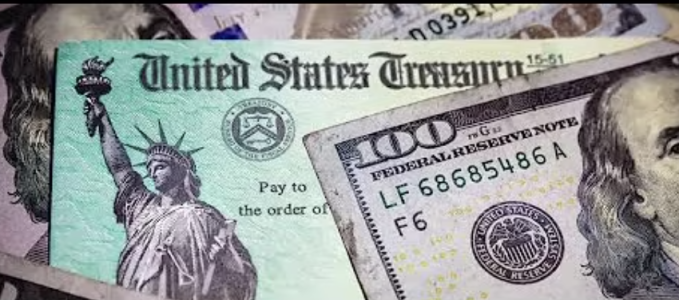The truth behind the $2,000 August stimulus rumors
By
Veronica E.
- Replies 1
Lately, social media has been buzzing with claims that President Donald Trump is sending out $2,000 stimulus checks this August.
With the cost of food, gas, and everyday essentials continuing to rise, it’s easy to see why the idea is gaining attention.
But before you start calculating how you’d spend such a windfall, it’s important to separate fact from rumor.
While several posts and articles are fueling the speculation, no official government source has confirmed a new stimulus.
Here’s the full story on where the rumor started, what’s actually available, and how to protect yourself from scams.

Where the $2,000 story came from
The talk of a new $2,000 payment began after a July 19 article by Rick Adams and various social media posts suggested lawmakers were considering fresh relief.
These reports outlined possible eligibility rules—such as income limits of $75,000 for single filers and $150,000 for married couples, plus additional amounts for dependents—and hinted that payments could arrive in late 2025 or early 2026.
While it sounded promising, none of these claims were backed by official announcements.
Also read: $600 revenue share stimulus checks may be headed your way—but only if you meet these 2 criteria
The reality: no confirmed stimulus
As of now, there’s no confirmation from Congress, the IRS, or the White House about a new $2,000 stimulus check—whether in August or later in 2025.
No bill has been introduced, no law passed, and no official funding allocated.
The most recent federal stimulus checks were issued in 2021 under the American Rescue Plan, with a maximum of $1,400 per eligible person.
While the IRS has continued processing some unclaimed payments from that period, the deadline to file for them expired on April 15, 2025.
Also read: Are DOGE stimulus checks the real deal or just a dream?
The "DOGE dividend" and other proposals
You may also have heard about a proposed $5,000 “DOGE dividend,” which Trump mentioned in February 2025.
This idea is tied to potential savings from a Department of Government Efficiency initiative, but it remains only a proposal—there’s no legislation or funding to support it.
It’s also unrelated to the $2,000 rumor.
Also read: When your August 2025 Social Security check will arrive—exact dates and tips to plan ahead
Social Security payments continue as usual
If you receive Social Security—whether retirement, disability (SSDI), or survivor benefits—your regular payments remain unaffected by the stimulus rumors.
These benefits are based on your work history and eligibility.
In 2025, the Cost-of-Living Adjustment (COLA) provided a modest increase, though many recipients have noted it hasn’t fully matched the pace of inflation.
Also read: This "IRS $1,400 rebate" text could be a trap—here’s how to spot and avoid the latest scam!
Scam alerts from the IRS
Whenever “free money” stories spread, scammers often follow.
The IRS has reported an uptick in fraudulent emails, texts, and social media messages claiming to offer $2,000 stimulus checks.
Remember: the IRS will never ask for personal information, bank details, or payment to release funds.
Suspicious messages should be reported, and any claims verified directly at irs.gov.
Also read: Tax chaos could be a goldmine—for the wrong people. Taxpayers at risk amidst as IRS uncertainty
How to stay safe and informed
Also read: You may get more in 2026—Social Security COLA estimate sees unexpected lift
Other available financial resources
Even without a new stimulus, there are still programs that may help:
While the idea of another $2,000 stimulus check may be appealing, there’s no federal plan in place to make it happen.
Staying informed through official channels is the best way to avoid falling for false claims or scams.
By focusing on verified resources and exploring legitimate assistance programs, you can protect your finances and make the most of the support that is truly available.
Read next: There’s no new $800 check coming—but here’s what help is still on the table

Have you been contacted about a $2,000 stimulus that turned out to be false? Or do you have strategies for stretching your budget in tough times? Sharing your experience could help others avoid scams and make the most of available resources.
With the cost of food, gas, and everyday essentials continuing to rise, it’s easy to see why the idea is gaining attention.
But before you start calculating how you’d spend such a windfall, it’s important to separate fact from rumor.
While several posts and articles are fueling the speculation, no official government source has confirmed a new stimulus.
Here’s the full story on where the rumor started, what’s actually available, and how to protect yourself from scams.

Rising living costs have fueled interest in online claims about new stimulus payments. Image Source: YouTube / KTNV Channel 13 Las Vegas.
Where the $2,000 story came from
The talk of a new $2,000 payment began after a July 19 article by Rick Adams and various social media posts suggested lawmakers were considering fresh relief.
These reports outlined possible eligibility rules—such as income limits of $75,000 for single filers and $150,000 for married couples, plus additional amounts for dependents—and hinted that payments could arrive in late 2025 or early 2026.
While it sounded promising, none of these claims were backed by official announcements.
Also read: $600 revenue share stimulus checks may be headed your way—but only if you meet these 2 criteria
The reality: no confirmed stimulus
As of now, there’s no confirmation from Congress, the IRS, or the White House about a new $2,000 stimulus check—whether in August or later in 2025.
No bill has been introduced, no law passed, and no official funding allocated.
The most recent federal stimulus checks were issued in 2021 under the American Rescue Plan, with a maximum of $1,400 per eligible person.
While the IRS has continued processing some unclaimed payments from that period, the deadline to file for them expired on April 15, 2025.
Also read: Are DOGE stimulus checks the real deal or just a dream?
The "DOGE dividend" and other proposals
You may also have heard about a proposed $5,000 “DOGE dividend,” which Trump mentioned in February 2025.
This idea is tied to potential savings from a Department of Government Efficiency initiative, but it remains only a proposal—there’s no legislation or funding to support it.
It’s also unrelated to the $2,000 rumor.
Also read: When your August 2025 Social Security check will arrive—exact dates and tips to plan ahead
Social Security payments continue as usual
If you receive Social Security—whether retirement, disability (SSDI), or survivor benefits—your regular payments remain unaffected by the stimulus rumors.
These benefits are based on your work history and eligibility.
In 2025, the Cost-of-Living Adjustment (COLA) provided a modest increase, though many recipients have noted it hasn’t fully matched the pace of inflation.
Also read: This "IRS $1,400 rebate" text could be a trap—here’s how to spot and avoid the latest scam!
Scam alerts from the IRS
Whenever “free money” stories spread, scammers often follow.
The IRS has reported an uptick in fraudulent emails, texts, and social media messages claiming to offer $2,000 stimulus checks.
Remember: the IRS will never ask for personal information, bank details, or payment to release funds.
Suspicious messages should be reported, and any claims verified directly at irs.gov.
Also read: Tax chaos could be a goldmine—for the wrong people. Taxpayers at risk amidst as IRS uncertainty
How to stay safe and informed
- Check official sources — Use sites like irs.gov and ssa.gov for accurate updates on stimulus, tax credits, and benefits.
- Protect your personal information — Never share sensitive data with someone who contacts you unexpectedly.
- Be wary of payment requests — No legitimate government payment requires a processing fee.
Also read: You may get more in 2026—Social Security COLA estimate sees unexpected lift
Other available financial resources
Even without a new stimulus, there are still programs that may help:
- Unclaimed tax credits — If you missed out on past relief or credits, you might qualify by filing an amended tax return.
- State and local aid — Some areas offer targeted assistance for seniors, renters, or low-income households.
- Utility and food programs — Options like LIHEAP for energy costs and SNAP for groceries can help offset expenses.
While the idea of another $2,000 stimulus check may be appealing, there’s no federal plan in place to make it happen.
Staying informed through official channels is the best way to avoid falling for false claims or scams.
By focusing on verified resources and exploring legitimate assistance programs, you can protect your finances and make the most of the support that is truly available.
Read next: There’s no new $800 check coming—but here’s what help is still on the table
Key Takeaways
- Rumors of a $2,000 August stimulus linked to Donald Trump are circulating online, but no official confirmation exists from Congress, the IRS, or the White House.
- No new stimulus legislation has been passed; the last federal payments were part of the 2021 American Rescue Plan, and the filing deadline for unclaimed checks passed on April 15, 2025.
- Trump’s separate “DOGE dividend” proposal is unrelated to the $2,000 rumor and has not been approved or funded.
- The IRS warns of scams tied to these rumors, advising people to verify any claims directly through official government websites.
Have you been contacted about a $2,000 stimulus that turned out to be false? Or do you have strategies for stretching your budget in tough times? Sharing your experience could help others avoid scams and make the most of available resources.






